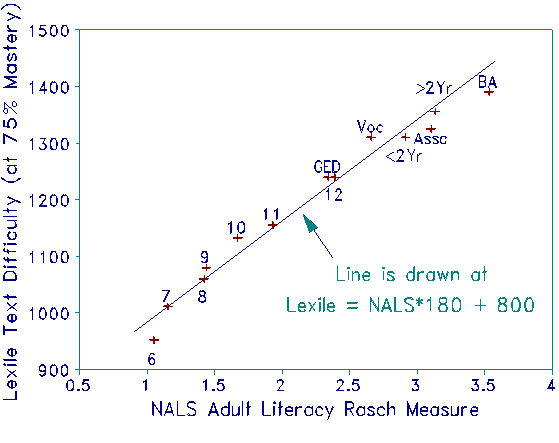
Progress is signalled by the ability to predict outcomes. Data from the National Adult Literacy Survey (NALS) confirm Jack Stenner's Lexile theory in the same way that quark detection confirms particle physics. When the lexile values necessary for 75% mastery of the reading material used at each grade level are plotted against the mean NALS Rasch measures of adult literacy corresponding to each year of final education, a startlingly simple and decisive confirmation of the Lexile theory appears. The relationship between the theoretical lexiles and the empirical Rasch measures is a straight line! It follows that the Lexile construct can organize and predict a fundamental feature of our complex world, the ability to understand and use written language. The educational, commercial and political implications are profound and extensive.
Lexile theory posits that the reading difficulty of ordinary text is dominated by word frequency and sentence length. Stenner's Lexile Scanner reads text segments, looks up word frequencies and counts sentence lengths. It then predicts the reading difficulty of the text in lexile units computed from the mean loge word infrequency and the mean loge sentence length. Stenner has lexiled reading materials from nursery to graduate school and beyond. This includes the particular materials used at each level of education from grade school through college.
The NALS data come from 24,944 US adults answering selections from 169 English literacy items. Dick Vanezky, John Michael Linacre and Ben Wright have estimated the mean Rasch NALS literacy levels for adults at each year of final education from grade school through college. The NALS items were designed and administered with no reference to Lexile theory.
In the plot, mean literacy levels increase in equal steps with education levels. Thus, on the average, we are only as literate as the reading materials at our last year of education! Our literacy level does not change with reading activity after formal schooling ends, but our literacy does decline from around age 40. Other NALS analyses show a similar linearity between mean literacy, education level and loge income! Thus, on the average, we are only as rich as our literacy and education allow!
Stenner's studies show that the literacy level needed to read newspapers is above 1200 lexiles. On the plot 1200 corresponds to finishing high school. Thus, for a democracy based on informed voters to survive, we must see to it that all youth finish high school. When we leave school prematurely, we condemn ourselves to an unnecessarily impoverished life. Staying through high school has got to be a national priority!

Reading in America: Stenner's Lexiles confirmed! Wright BD, Stenner AJ, Vanezky R. … Rasch Measurement Transactions, 1995, 8:4 p.387
| Forum | Rasch Measurement Forum to discuss any Rasch-related topic |
Go to Top of Page
Go to index of all Rasch Measurement Transactions
AERA members: Join the Rasch Measurement SIG and receive the printed version of RMT
Some back issues of RMT are available as bound volumes
Subscribe to Journal of Applied Measurement
Go to Institute for Objective Measurement Home Page. The Rasch Measurement SIG (AERA) thanks the Institute for Objective Measurement for inviting the publication of Rasch Measurement Transactions on the Institute's website, www.rasch.org.
| Coming Rasch-related Events | |
|---|---|
| Jan. 16 - Feb. 13, 2025, Fri.-Fri. | On-line workshop: Rasch Measurement - Core Topics (E. Smith, Winsteps), www.statistics.com |
| Apr. 8 - Apr. 11, 2026, Wed.-Sat. | National Council for Measurement in Education - Los Angeles, CA, ncme.org/events/2026-annual-meeting |
| Apr. 8 - Apr. 12, 2026, Wed.-Sun. | American Educational Research Association - Los Angeles, CA, www.aera.net/AERA2026 |
| May. 15 - June 12, 2026, Fri.-Fri. | On-line workshop: Rasch Measurement - Core Topics (E. Smith, Winsteps), www.statistics.com |
| June 19 - July 25, 2026, Fri.-Sat. | On-line workshop: Rasch Measurement - Further Topics (E. Smith, Winsteps), www.statistics.com |
The URL of this page is www.rasch.org/rmt/rmt84a.htm
Website: www.rasch.org/rmt/contents.htm